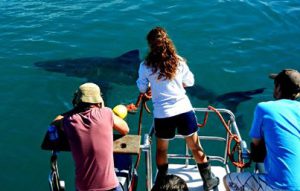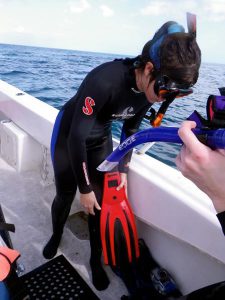What is your scientific background?
I hold a Bachelor’s degree in Marine Ecology and Conservation from New College of Florida, USA and a Master’s degree in Marine Biology from Victoria University of Wellington, NZ.

Which topic are you working on at the moment? Why did you choose this topic and how do you think you’ll make a difference?
I am actively engaged in research, exploration, communication, and application of scientific knowledge related to the conservation of marine ecosystems. I study sharks and their relatives (the skates, rays, and chimaeras). I’ve always had a fascination with misunderstood predators and these tend to be the most demonised. Specifically, I look at their migratory patterns and habitat use – answering why they are where they are. I’m also interested in how media portrays these animals and how that sways conservation efforts.
Why did you choose to become a scientist?
I am fascinated with the natural world– especially the ocean! I just wanted to learn more about it. I grew up watching David Attenborough documentaries and The Wild Thornberry’s on Nickelodeon. I guess you could say that Eliza Thornberry was who got me interested in biology, as I was envious of her ability to communicate with animals. I wanted that super power- to ask animals where they went, why they did what they did, etc.
Did you have a role model that influenced your decision to work in science?
David Attenborough brought it to life for me. Suddenly it was no longer just a cartoon I watched after school but an actual subject I could follow. The ocean had always captivated my heart, and these two people (one fictional and one so tangible) led me to the road, paved with role models like Sylvia Earle and Eugenie Clark. These people drove me to graduate high school and then pursue a Bachelor’s degree in Marine Ecology and Conservation. And this journey led me to pack my bags and move from Florida, USA to Wellington, NZ and get a Master’s degree in Marine Biology. My curiosity about the natural world was never satisfied, which is why I hope to begin a doctorate soon.

How did you choose your field of study?
There is nowhere I would rather be than making observations outside in nature. For me, the ocean holds my curiosity and passion. I was born with an extreme fascination for misunderstood predators and sharks are the most misunderstood predator of them all.
What are the hardest parts related to this work?
How isolating some of the work can be! But that’s just the nature of our work, at times.
What are your biggest achievements, and what your biggest failures?
I think my greatest achievement was going across the stage to get my MSc. But doing radio interviews, podcasts, and a TEDx talk has been pretty great too. To me, my biggest failure is walking away from a Ph.D. offer – but I wasn’t passionate about it, and it came with no funding. Not thanks.
What is a typical day like for you?
When I say “shark scientist,” many think my days are filled with constantly being in the field. During the field season, maybe this is the case… but the rest of the time I’m either reading research articles, doing data analysis, or writing! Science is interesting in that no two days are ever the same—and you are always learning new things!

Did you ever doubt your abilities as a scientist? Why? How did you handle these situations/feelings?
Yes! The hardest part of my career has been how to turn rejection into motivation. As an early career scientist, and I’ve heard a lot of “no,” “this won’t work,” and “I’m not interested” which I at first took personally. But I took these challenges and turned them into feelings I could use to get fired up!
What (or who) motivated you in difficult times?
I’m lucky that I have a strong support system in my family, my friends, and my colleagues. The women I have in my life are full of intelligence, confidence, and determination, making them incredible role models for me.

In ten years, what do you hope to have accomplished in terms of your work?
I have big dreams—I like having goals that scare me. I first and foremost want to continue my work with The Fins United Initiative, making it a true non-profit organisation with a structural home base that will act as an aquarium and research hub. I also hope to get a Ph.D., focusing my work on marine outreach – making sure the public gets reliable information about sharks and their relatives (to help them better understand/back policies)! Some other dreams include joining many of my idols in being a National Geographic Fellow/Explorer, a Pew Fellow in Marine Conservation, a TED Fellow, a WEF Young Global Leader, and get in the Forbes 30 under 30. I’ve got some work to do, haha!
Is there any scientific topic (outside of your field of research) that you think should have more scientific attention? Which one?
Climate change!
During your career, have you been specifically mentored or supported by someone?
Not really, but I’ve started making those connections to have mentors in these next stages of my life.

If you were completely free to choose a scientific topic to work on, which would it be?
I would attach tracking tags to all of the Chondrichthyans (sharks, skates, rays, and chimaeras) to figure out where they all go!
What is the funniest or most memorable thing that has happened to you while working in science?
Around this time four years ago I got stung by a bark scorpion (the deadliest scorpion in North America because go big or go home, right?) which paralysed my right hand and my right arm for around three weeks. My parents had a field day with that, as did my worrying professor(s) and classmates since I didn’t get antivenom in time. Just recently I got bit by an octopus (species unknown because they’re not an animal I study in depth, but it’s not the blue-ringed octopus) during a show-and-tell at the marine lab I volunteer. Her beak got me right at my wrist, between two veins (phew!), as her tentacles wrapped all around my arm up to my elbow. Oops!
Do you come from an academic family?
Both my parents went to college and encouraged me to do so as well.
How does your family regard your career choice?
They have always been very supportive- but I think my dad wanted me to stick with manatees. Or guppies, haha.
Besides your scientific interests, what are your personal interests?
Outside of science, you can find me snuggled up on the couch watching documentaries or funny cartoons with my husband. We have enjoyed our time living in New Zealand these past few years (very different from my beginnings in Puerto Rico), and spend our free time road tripping to different parts of the country! If not with him, I love hanging out with girlfriends at a pub quiz night or going hiking.

Is it hard to manage both career and private life? How do you manage both?
I have a hard time pulling away from my computer, but I try to keep weekends work-free for time with my hubby, my friends, and myself.
If you had the option to give advice to a younger version of yourself, what would that be?
Not to worry so much. It’s a terrible season in life when you start to spend more time caring what other people think.
What kind of prejudices, if any, did you have to face? How did that make you feel? Were you able to overcome these?
I am not alone in that I have faced incessant racism, sexism, ageism and more. I am outspokenly passionate about the potential of young women, especially Latina women. There’s this stereotype that Latinas “get knocked up early” and are better “Housewives” than anything else, so I often get the backhanded compliment of, “You’re pretty smart for a Hispanic” which does no one any favours. You either put your head down and do the work or call out the comments. I’ve done both. I believe anyone can do science, regardless of their background!

In your opinion, which changes, if any, are needed in the scientific system to be more attractive to female scientists and possible future scientists?
We need to support the women already in these fields. Scientific societies, universities, programs, etc. should work together to help elevate women scientists to leadership positions and support career development. Just like the visibility of women in STEM is important for kids, the absence of females in leadership roles can be a contributing factor to why many don’t stay.
Do you have anything else that you’d like to tell us about?
I recently gave a TEDx talk on sharks and female scientists, which you can watch here!
If you want to contact Melissa, you can reach out to her on Twitter or write an e-mail (melissacristinamarquez@gmail.com).




